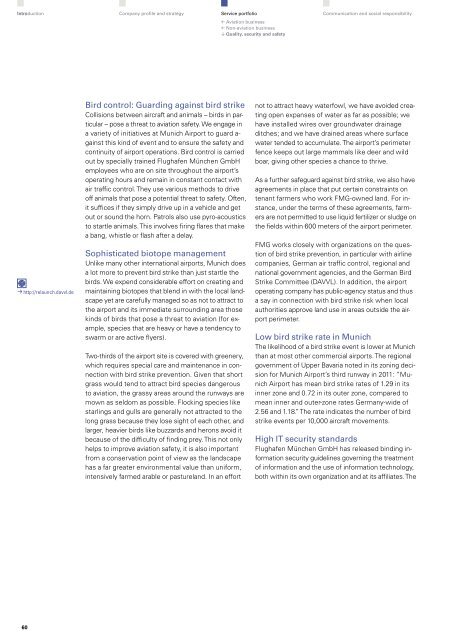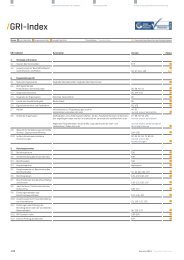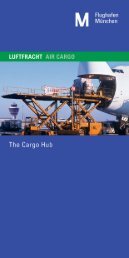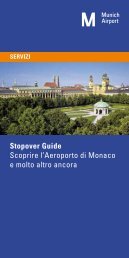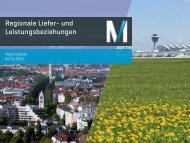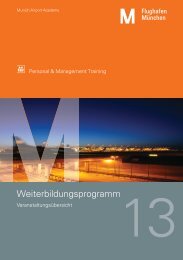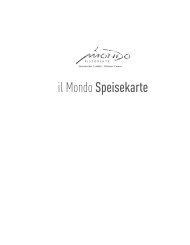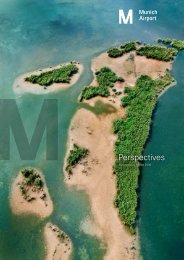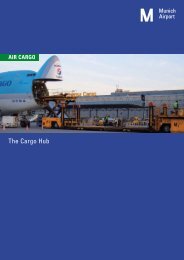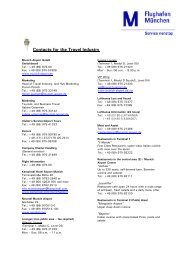"Perspectives 2011" - Sustainability and Annual Report (pdf)
"Perspectives 2011" - Sustainability and Annual Report (pdf)
"Perspectives 2011" - Sustainability and Annual Report (pdf)
You also want an ePaper? Increase the reach of your titles
YUMPU automatically turns print PDFs into web optimized ePapers that Google loves.
Introduction Company profile <strong>and</strong> strategyService portfolio Communication <strong>and</strong> social responsibilityP Aviation businessP Non-aviation businessq Quality, security <strong>and</strong> safety) http://relaunch.davvl.deBird control: Guarding against bird strikeCollisions between aircraft <strong>and</strong> animals – birds in particular– pose a threat to aviation safety. We engage ina variety of initiatives at Munich Airport to guard a-gainst this kind of event <strong>and</strong> to ensure the safety <strong>and</strong>continuity of airport operations. Bird control is carriedout by specially trained Flughafen München GmbHemployees who are on site throughout the airport’soperating hours <strong>and</strong> remain in constant contact withair traffic control. They use various methods to driveoff animals that pose a potential threat to safety. Often,it suffices if they simply drive up in a vehicle <strong>and</strong> getout or sound the horn. Patrols also use pyro-acousticsto startle animals. This involves firing flares that makea bang, whistle or flash after a delay.Sophisticated biotope managementUnlike many other international airports, Munich doesa lot more to prevent bird strike than just startle thebirds. We expend considerable effort on creating <strong>and</strong>maintaining biotopes that blend in with the local l<strong>and</strong>scapeyet are carefully managed so as not to attract tothe airport <strong>and</strong> its immediate surrounding area thosekinds of birds that pose a threat to aviation (for example,species that are heavy or have a tendency toswarm or are active flyers).Two-thirds of the airport site is covered with greenery,which requires special care <strong>and</strong> maintenance in connectionwith bird strike prevention. Given that shortgrass would tend to attract bird species dangerousto aviation, the grassy areas around the runways aremown as seldom as possible. Flocking species likestarlings <strong>and</strong> gulls are generally not attracted to thelong grass because they lose sight of each other, <strong>and</strong>larger, heavier birds like buzzards <strong>and</strong> herons avoid itbecause of the difficulty of finding prey. This not onlyhelps to improve aviation safety, it is also importantfrom a conservation point of view as the l<strong>and</strong>scapehas a far greater environmental value than uniform,intensively farmed arable or pasturel<strong>and</strong>. In an effortnot to attract heavy waterfowl, we have avoided crea -ting open expanses of water as far as possible; wehave installed wires over groundwater drainageditches; <strong>and</strong> we have drained areas where surfacewater tended to accumulate. The airport’s perimeterfence keeps out large mammals like deer <strong>and</strong> wildboar, giving other species a chance to thrive.As a further safeguard against bird strike, we also haveagreements in place that put certain constraints ontenant farmers who work FMG-owned l<strong>and</strong>. For in -stance, under the terms of these agreements, farmersare not permitted to use liquid fertilizer or sludge onthe fields within 600 meters of the airport perimeter.FMG works closely with organizations on the questionof bird strike prevention, in particular with airlinecompanies, German air traffic control, regional <strong>and</strong>national government agencies, <strong>and</strong> the German BirdStrike Committee (DAVVL). In addition, the airportoperating company has public-agency status <strong>and</strong> thusa say in connection with bird strike risk when localauthorities approve l<strong>and</strong> use in areas outside the airportperimeter.Low bird strike rate in MunichThe likelihood of a bird strike event is lower at Munichthan at most other commercial airports. The regionalgovernment of Upper Bavaria noted in its zoning deci -sion for Munich Airport’s third runway in 2011: “MunichAirport has mean bird strike rates of 1.29 in itsinner zone <strong>and</strong> 0.72 in its outer zone, compared tomean inner <strong>and</strong> outer-zone rates Germany-wide of2.56 <strong>and</strong> 1.18.” The rate indicates the number of birdstrike events per 10,000 aircraft movements.High IT security st<strong>and</strong>ardsFlughafen München GmbH has released binding informationsecurity guidelines governing the treatmentof information <strong>and</strong> the use of information technology,both within its own organization <strong>and</strong> at its affiliates. The60


